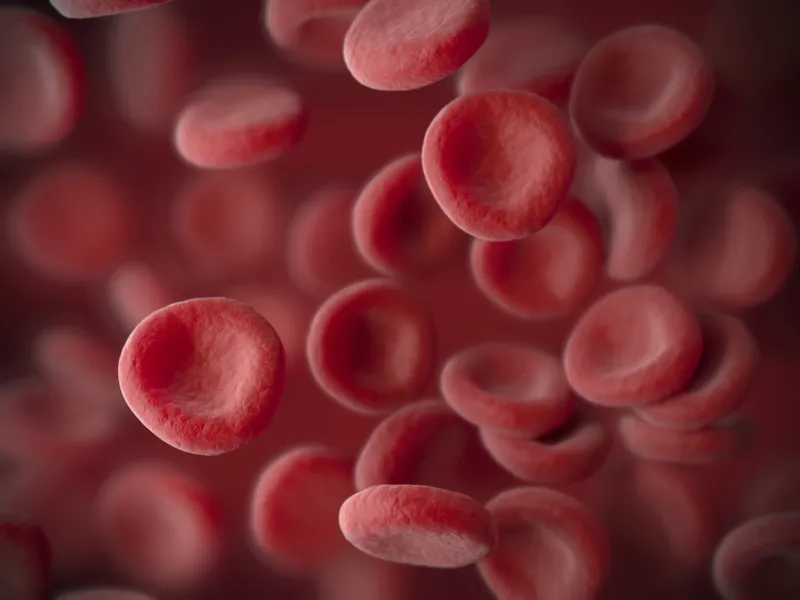Pernicious anaemia: causes, symptoms & management
What's covered?



Pernicious anaemia is the most common cause of vitamin B12 deficiency in the UK. This type of anaemia occurs because of an immune response which stops your body from absorbing enough vitamin B12. Without enough vitamin B12, you become deficient, and your body produces abnormally large red blood cells that can't carry enough oxygen around your body.
What is pernicious anaemia?
Pernicious anaemia is a type of anaemia where your body either doesn't produce or can’t use a protein called intrinsic factor. This protein is crucial for your body to absorb vitamin B12. Vitamin B12 is used for making red blood cells, DNA, keeping nerve cells healthy and also supports your immune system.
What causes pernicious anaemia?
Cells in your stomach lining release the intrinsic factor that helps you absorb vitamin B12. Pernicious anaemia is thought to be caused by an autoimmune reaction where your body mistakenly attacks both these cells and the intrinsic factor protein. This can also cause a weakened stomach lining (atrophic gastritis).
Research suggests that pernicious anaemia tends to run in families. Those of Northern European or Scandinavian ancestry and with a history of autoimmune endocrine disorders (when your body attacks the organs that make your hormones) also seem to have a higher risk of pernicious anaemia.
What are the signs and symptoms of pernicious anaemia?
The longer you're deficient in vitamin B12, the more severe your symptoms can become.
Some of the symptoms associated with pernicious anaemia and vitamin B12 deficiency include:
- extreme tiredness
- abnormally fast heart rate (tachycardia)
- loss of appetite
- diarrhoea or constipation
- pale or yellowish skin
- feeling breathless
- headaches
What are the complications of pernicious anaemia?
When you're deficient in vitamin B12 for a very long time, this might affect your nervous system, which can lead to the following:
- confusion
- struggling to concentrate
- tingling or a numb feeling in hands and feet
- loss of balance
- depression
- hallucinations
- memory issues and dementia
You should see your doctor immediately if you have any of these symptoms. You can get serious medical issues like permanent nerve damage if you don't treat pernicious anaemia.
It's possible to have pernicious anaemia without showing any signs and symptoms. Your body can store vitamin B12 for a while; it can take a couple of years for your body to run out of its reserves and for symptoms to show up.
How is pernicious anaemia diagnosed?
If you have symptoms of vitamin B12 deficiency, your GP might recommend blood tests and other checks to confirm or rule out pernicious anaemia. This might include:
- checking the size of your red blood cells
- checking the level of vitamin B12 in your blood
- checking the level of vitamin B9 (folate) in your blood
- checking your blood for the antibodies that attack the stomach cells and intrinsic factor
- an endoscopy — where a long, thin tube with a tiny camera is placed inside your body (typically via your mouth) to check your stomach lining
It's important to note the difference between active and total vitamin B12 in your body. Active vitamin B12 is the type your body uses, whereas total vitamin B12 measures the total amount of vitamin B12 in your body.
A blood test might show that your vitamin B12 is normal, but this might only be the total vitamin B12 and not actually the amount your body can use.
If your GP confirms a vitamin B12 deficiency through a blood test and symptoms, you might be referred to a specialist for further tests, which can include:
- a specialist in treating blood conditions (a haematologist)
- a specialist in treating digestive issues that might affect the absorption of vitamin B12
How to treat pernicious anaemia
In the case of pernicious anaemia, your body can’t absorb vitamin B12 through diet alone. You’ll usually need injections of vitamin B12 a few times per week to start with and then every 2 to 3 months for life. But depending on your symptoms and B12 level you may need these injections more regularly.
After that, you might need to monitor your vitamin B12 levels regularly to make sure the injections are working.
There are two types of vitamin B12 injections:
- hydroxocobalamin
- cyanocobalamin
In the UK, hydroxocobalamin is the most common form of vitamin B12 injection given, as it stays in your body for longer.
How to manage pernicious anaemia
If you have pernicious anaemia, the good news is that if it is caught early it’s usually possible to reverse the symptoms of vitamin B12 deficiency.
A useful way to manage this condition is regularly monitoring your vitamin B12 levels with a home blood test. A vitamins blood test is a good way to monitor your active vitamin B12 levels.
Because pernicious anaemia affects the absorption of Vitamin B12 from food by your gut, it would be difficult to increase your vitamin B12 through your diet or a supplement so it is important to see your doctor for treatment.
Andres E, Serraj K. Optimal management of pernicious anemia. J Blood Med. 2012;3:97-103. doi: 10.2147/JBM.S25620. Epub 2012 Sep 10. PMID: 23028239; PMCID: PMC3441227
National Health Service (NHS) Vitamin B12 or folate deficiency anaemia Retrieved September 1, 2022, from https://www.nhs.uk/conditions/vitamin-b12-or-folate-deficiency-anaemia/causes/
Maamar, Mouna & Adnaoui, Mohamed. (2020). Pernicious Anaemia: Mechanisms, Diagnosis, and Management. EMJ Hematology. 71-80. 10.33590/emjhematolu/19-00187.
Rodriguez NM, Shackelford K. Pernicious Anemia. [Updated 2022 Jul 4]. In: StatPearls [Internet]. Treasure Island (FL): StatPearls Publishing; 2022 Jan-. Available from: https://www.ncbi.nlm.nih.gov/books/NBK540989/